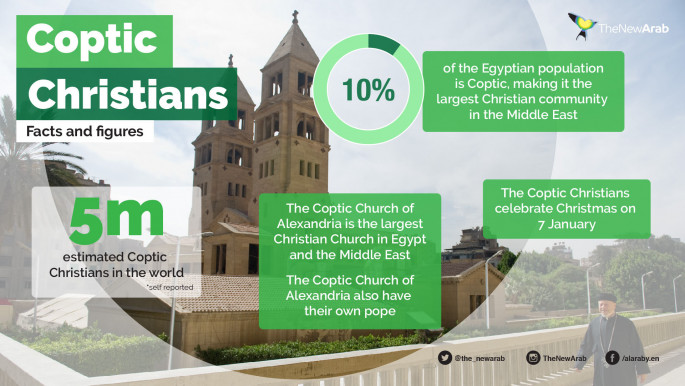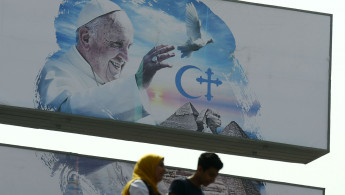Pope of peace in tense Egypt
The three-month state of emergency imposed following the attacks, low morale and little hope of being heard have set the mood among Egypt's battered Coptic community.
This is the atmosphere that Pope Francis will find during his two-day visit to Cairo, taking place under the slogan "The Pope of Peace in the Egypt of Peace" – a call for peace and dialogue between East and West, that bears even more significance today.
Muted enthusiasm and low expectations among Egyptian Copts characterise a community worn out by regular threats and persecutions from the Sinai Peninsula to Upper Egypt.
In February, hundreds of Christians fled north Sinai after a spate of targeted killings by IS-affiliated militants.
Several incidents of harassment have been reported, with Coptic homes and places of worship being set on fire in Upper Egypt, particularly in the Minya region.
Coptic activist Beshoy Tamry points to the case of Kom El-Loufy, a village in Minya, where a extremists reportedly attacked Christians on Holy Thursday (13 April) as they returned from a prayer gathering, burning three of their homes and throwing bricks and stones.
 |
Most Coptic activists believe that Pope Tawadros II speaks on behalf of the regime, not the Coptic community - Coptic activist Beshoy Tamry |
 |
"During Easter celebrations, the Coptic villagers were trapped in their homes for fear of more attacks," Tamry recalled, adding that the incident sparked a social media campaign by Coptic activists.
In Tamry's view, such appeal to the Catholic Pope sends a message that "We are now addressing Francis who will listen to the suffering of people", implying that Copts are bypassing Pope Tawadros II – head of Egypt's Coptic Orthodox Church – as they feel abandoned by their own Church.
"We have a lot of stories like Kom El-Loufy in Egypt", he said.
Copts feel disappointed with their Church, as well as with the president and his government.
"People expected Sisi would be a better deal for the Coptic community, and it turned out that he wasn't. This disenchantment has been growing for a long time but it's more palpable right now," noted Wael Eskandar, independent journalist, blogger and activist of Coptic descent.
| Read more: Coptic Christians – Egypt's forsaken community |
Today, a number of Copts are not comfortable with their Church's relationship with the state. Coptic Christians had high expectations after the military-backed ouster of Islamist President Mohamed Morsi of July 2013.
"Most Coptic activists believe that Pope Tawadros II speaks on behalf of the regime, not the Coptic community," Tamry pointed out.
For Ishaq Ibrahim, religious freedoms researcher at the Egyptian Initiative for Personal Rights (EIPR), the visit of the Pope is a "positive step’’ in terms of inter-religious dialogue, however more needs to be done to combat the forces that engender religious extremism.
 |
How can we talk about religious reforms or freedom of expression while al-Azhar files lawsuits against independent voices? - Ishaq Ibrahim, religious freedoms researcher |
 |
"Extremist ideology won't be gone after the Pope's visit", argued the researcher. "We need to work on different levels to change this mentality, both in the state and society, that enables discrimination and intolerance."
Ibrahim raised the problem of Egyptian intellectuals and public figures who have been punished for their anti-regime opinions, citing examples such as TV presenter Islam El-Beheiry, Muslim preacher Mohamed Abdallah Nasr and poet Fatima Naoot, sentenced on charges of "contempt of religion".
"How can we talk about religious reforms or freedom of expression while al-Azhar files lawsuits against independent voices?" questioned the EIPR's researcher.
Until the state alongside religious, cultural, educational and media institutions in Egypt does its part in fighting extremism, he does not expect a big change to result from the papal visit.
 |
My concern is that the Pope endorses the narrative of protecting minorities and fighting terror in the way it is done by the regime - Eskandar, journalist |
 |
Pope Francis will meet with Sheikh Muhammad Ahmed al-Tayeb, Grand Imam of al-Azhar University, as well as Pope Tawadros II and will pay a courtesy visit to President Abdel Fattah al-Sisi.
His plan to meet Islamic religious leaders was received with criticism from church conservatives in the light of the April 9 terror attacks. How he will manage to revive dialogue with Islam without hurting sensibilities within the Christian community remains to be seen.
Pope Francis will face a difficult task – expressing solidarity with the Coptic-Christian minority, but not in too strong terms as to pre-empt further attacks by extremists; or speaking out against the silencing of political opposition under the current regime, without overtly undermining Sisi's leadership.
"I would expect him to extend the idea of minorities beyond Christianity, and also to point out oppression, though he may not identify the oppressors so that he doesn't lose favour completely with the regime and the need to protect Christians," predicts Eskandar.
The journalist shared some reservations about the outcome of Francis' visit.
"My concern is if the Pope endorses the narrative of protecting minorities and fighting terror in the way it is done by the regime, that would be dangerous because the state's policies are in fact conducive to terrorism," he stated.



